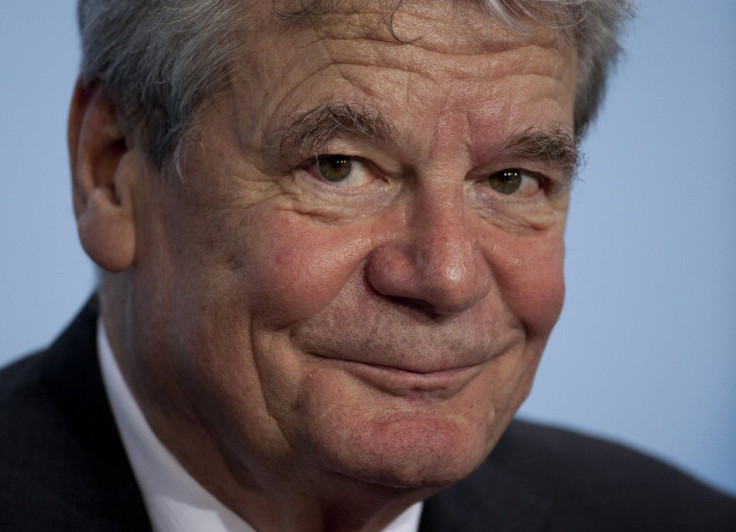Joachim Gauck: Five Things to Know About Germany’s Next President

On Friday, Christian Wulff resigned as president of Germany after the tabloid Bild released evidence of his corrupt business dealings. Two days later, Chancellor Angela Merkel and representatives from Germany's main political parties agreed on a replacement: Joachim Gauck, 72, a candidate whose popularity with the public may help restore some faith to the office of the presidency.
How he'll handle his responsibilities remains to be seen; for now, here are five insights into his past and present that may hint at his plans for the future.
His Position is Somewhat Symbolic
Once in office, Gauck will not be passing legislation, approving budgets or attending to crises in the euro zone. Instead, he will serve a largely ceremonial function as a moral authority for the state. While it is true that the president signs laws, appoints people to federal office and reviews treaties, all of these actions are subject to approval or veto by the chancellor or members of Parliament.
Since the position lacks real power, Gauck's presidential candidacy will not be put to a public vote. He will officially assume office when he is elected by a special parliamentary committee, and this formality is slated to take place before March 18.
He's Applied for This Job Before
In 2010, Gauck sought the presidential nomination and failed. He was defeated by Wulff, who was backed by Merkel. Had the public voted, the outcome would have been different -- opinion polls conducted at the time showed a clear preference for Gauck. He also found a wide base of support from the opposition Social Democrats and the Greens, though he was not officially affiliated with either party.
Determined to see Wulff take the presidency, Merkel overcame some strong resistance. It took three rounds of voting before she was able to convince members of the Federal Assembly to give Wulff the absolute majority he needed. Gauck's eventual emergence as the victor strikes many as an embarrassing turn of events for the chancellor.
His Past Influences His Politics
Gauck is an ardent patriot, staunch capitalist and outspoken champion of governmental transparency, and it is clear that his personal history has shaped his worldview. He grew up under communism in East Germany, eventually playing a major role in the protests leading up to reunification of the state in 1990.
In June of 1951, an 11-year-old Gauck watched as the East German state security police -- the infamous Stasi -- stormed into his home and seized his father, who was sentenced to labor at a Siberian gulag for several years.
After reunification, Gauck worked tirelessly to make old Stasi documents, including spy reports and records of arrests, available to the public. He achieved a federal declassification ruling in 1992 and became the first federal commissioner for the Stasi Archives. Since then, media frequently refer to him as the Stasi Hunter.
He's Got Character
German politicians aren't known for being charismatic, but Gauck defies the expectations. His habitual speech is at once direct and grandiose, and his ability to captivate audiences is well-known. He often tells stories about his struggles in East Germany, and has been known to get downright romantic about freedom, democracy, and the German constitution.
He feels specially attuned to the attitudes of the public, and is not afraid to say so. It's so often I feel what is going on in people even before they notice it themselves, he said to a reporter from Spiegel during his 2010 presidential run. And then my words are there for these feelings. I'm like a medium for people. Statements like these are, as the reporter himself noted, a little strange. But if public opinion is any indication, it works for Gauck.
What It Means for Merkel
Merkel and Gauck share similar pasts. They both have strong ties to the Lutheran church; Gauck, like Merkel's father, was a pastor. They both grew up in East Germany and then pursued politics after reunification. They know each other, and are reportedly friends. But Merkel kept him from the presidency in 2010, and it seems she is only now acquiescing in order to settle the issue and turn her attention back to the euro zone.
For Merkel, this represents a small defeat in the game of power politics. Affirming Gauck's nomination is akin to admitting her mistake in pushing Wulff two years ago. Furthermore, this position gives Gauck has quite a soapbox to stand on -- with his commitment to transparency, he'll be more likely than Wulff ever was to alert the public to any instances of federal corruption or skewed priorities.
In the end, that's what makes Gauck an ideal candidate for this job. When Wulff resigned in disgrace, many Germans wondered whether his position in the federal government was even necessary. Now that Gauck is next in line, the public will be paying a bit more attention to the office of the presidency.
© Copyright IBTimes 2024. All rights reserved.






















